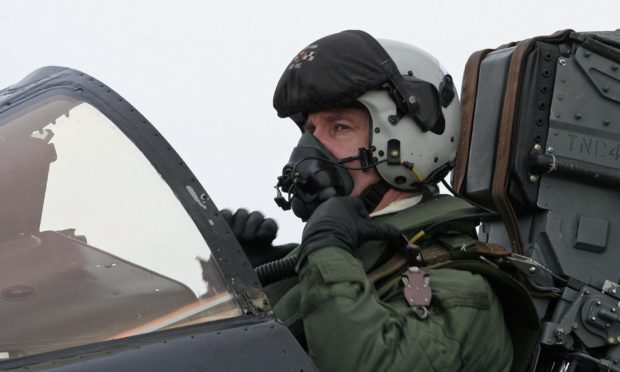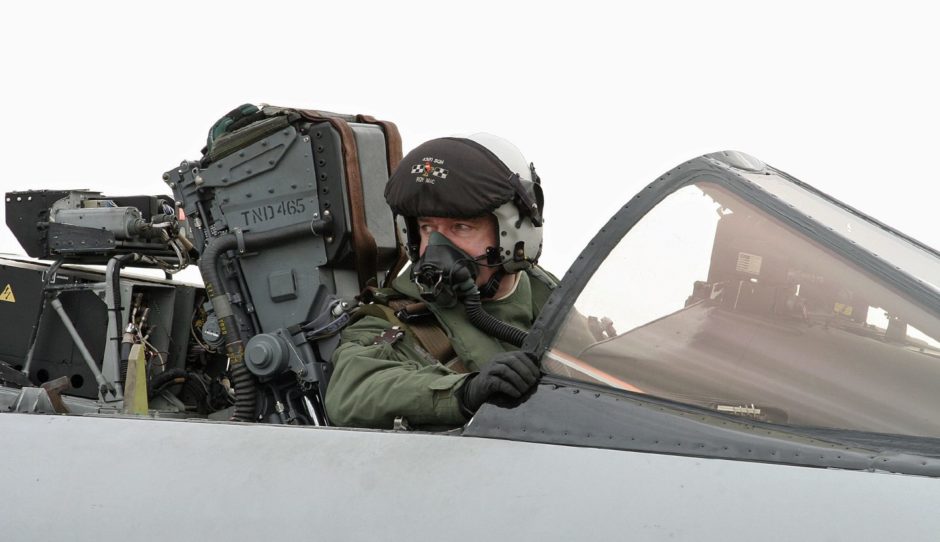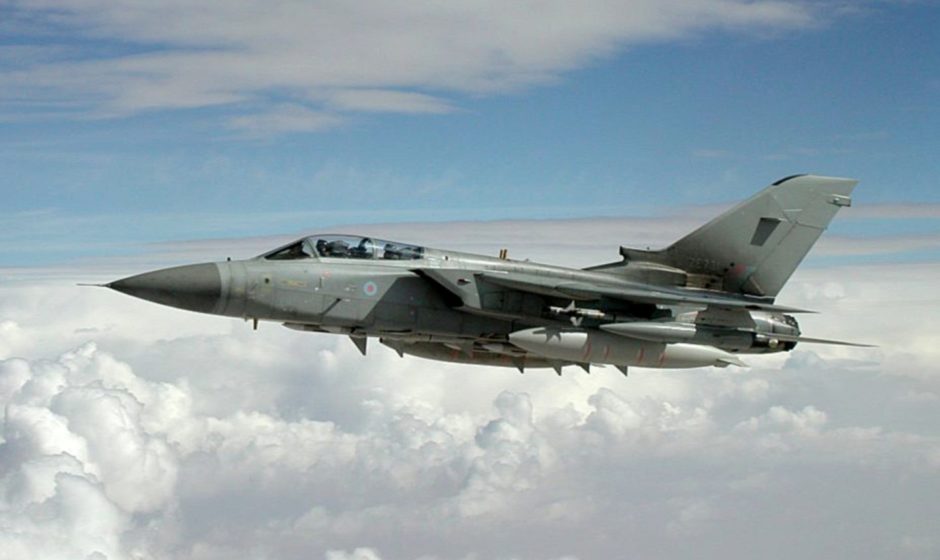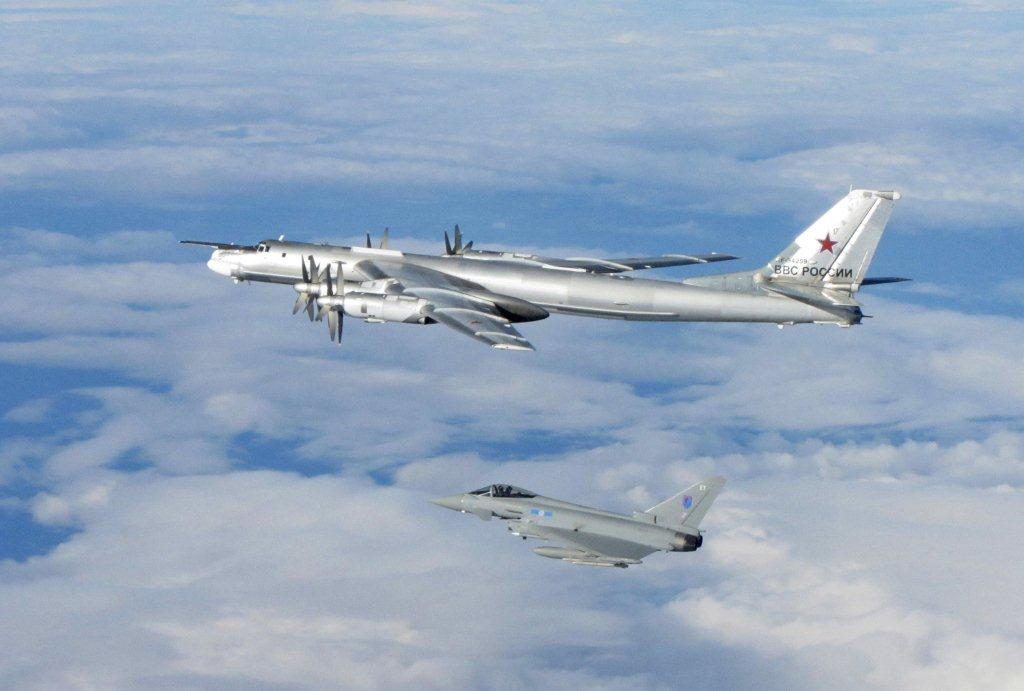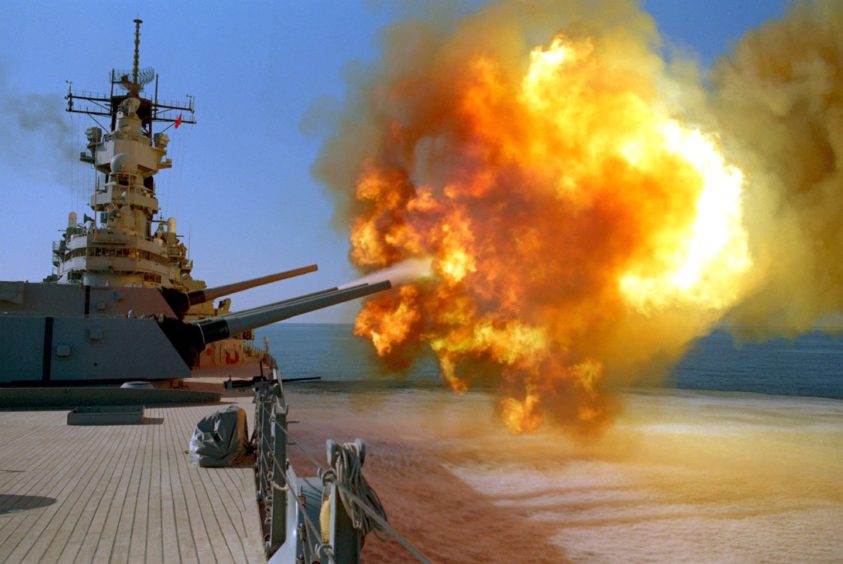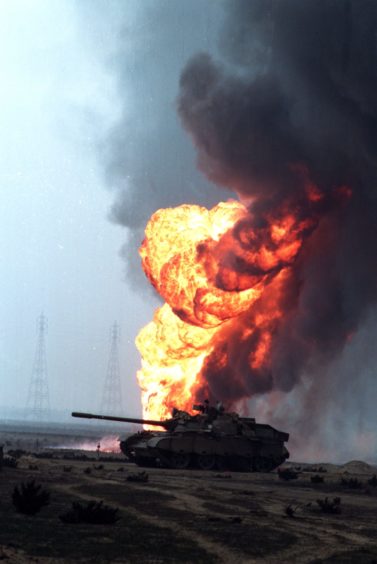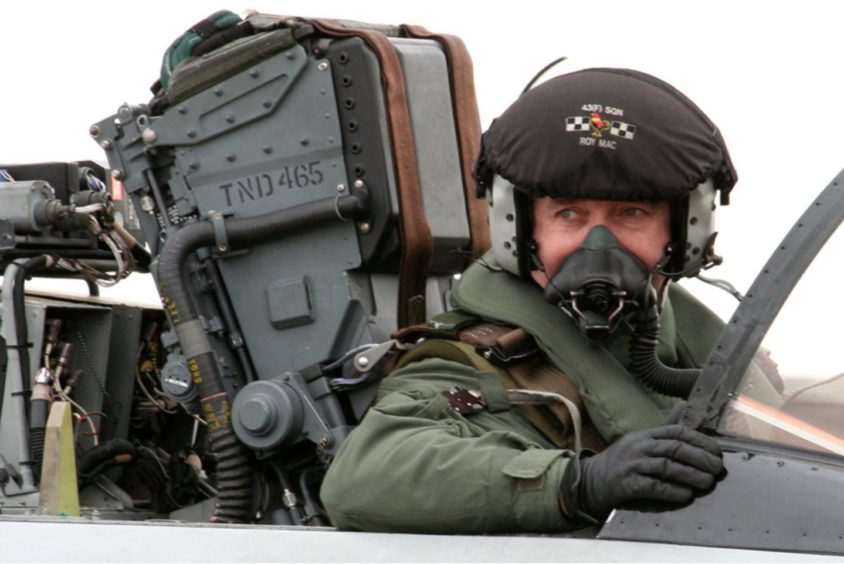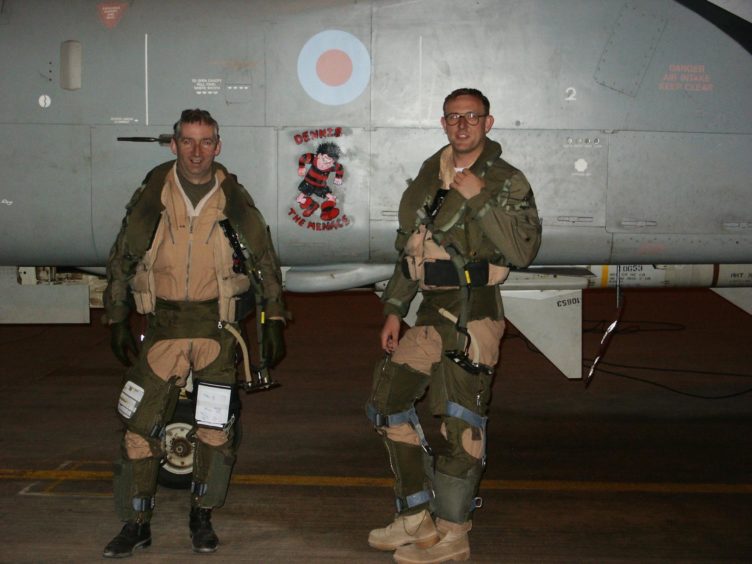Thirty years after the launch of Desert Storm to oust invading Iraqi forces from Kuwait, Michael Alexander speaks to a record breaking former RAF Leuchars fighter pilot who served in both Gulf Wars.
In the early hours of January 17 1991, the “mother of all battles” began with the start of the combat phase of the first Gulf War.
Operation Desert Storm was launched by the American, British, French, Saudi and Kuwaiti Allies to destroy Iraq’s military and civilian infrastructure through an enormous aerial bombing campaign aimed at military and strategic targets.
The trigger for the Gulf War was Iraq’s invasion of Kuwait on August 2, 1990 when it attempted to seize Kuwait’s vast oil reserves and relieve Iraq of crippling debts accrued during the Iran-Iraq War.
Undeterred by complete economic sanctions and a military build-up in the region by Allied forces, Iraq refused to comply with a UN ultimatum for its troops to withdraw from Kuwait by January 15.
This led the Allies to launch a devastating and sustained aerial bombardment involving cruise missiles launched from US warships. US, British and Saudi Arabian fighter planes, bombers and helicopters were also involved.
Within hours, Iraqi dictator Saddam Hussein defiantly took to state radio to declare: “The great duel, the mother of all battles has begun.”
Yet Saddam’s prediction that the “dawn of victory” was near could hardly have been more wrong.
After five weeks of more than 2,250 coalition aircraft flying in excess of 1,000 sorties a day, the Allies launched a land offensive on February 24.
Within a day, the Iraqis began retreating and on February 27 American President George H.W. Bush declared victory.
Kuwait was liberated but Saddam Hussein remained in power in Baghdad.
It would be another 12 years before President George W Bush led a “coalition of the willing” on a second invasion of Iraq with the aim of toppling the Bagdad regime.
Within a month of that conflict, Saddam Hussein had been ousted and the Americans were claiming victory in what many to this day see as an “illegal” war.
Former Leuchars pilot saw action in both Gulf Wars
One man who flew combat missions in both Gulf Wars is retired record breaking former RAF Leuchars fighter pilot Flight Lieutenant Roy Macintyre who lives in Cupar.
The Stirling-born officer, who holds the RAF record for the highest number of pilot hours (4600) flown in the Tornado F3, had recently converted to the Tornado F3 at RAF Leeming when, as a 32-year-old father-to-be, he was deployed to the Middle East with 23 Squadron to fly Desert Shield air defence sorties ahead of Desert Storm.
“I find it quite surprising to think that it was 30 years ago!” says the now 62-year-old retired father-of-two who retired from the RAF in 2018 latterly flying Tutors as an instructor with the Leuchars-based East of Scotland University Air Squadron.
“It all happened quite quickly in 1990 – the invasion of Kuwait.
“I was on 23 Squadron based at Leeming at the time – one of the three F3 squadrons down there.
“We saw things snowball quite quickly and we realised we were going to be part of something quite significant.”
Desert Shield
Flight Lieutenant Macintyre recalled how members of his squadron were given a date to depart for Saudi Arabia in September 1990.
However, it quickly became apparent that amid military spending issues, RAF aircraft were not war ready and there was a three-week delay that added to the emotions of leaving behind his wife Philippa, who, it emerged three weeks after he left, was pregnant with their first child Catherine.
“In the first Gulf War, between September and December 1990, I was part of what the Americans called Desert Shield which was exactly that – defending Saudi Arabia,” he recalls.
“We never went into Iraq or Kuwait at that stage.
“We were effectively sentries on the Saudi Arabian border and we did that for three months.
“All the time there was diplomatic stuff going on, but what we were doing was allowing the west’s war machine to build in Saudi Arabia ready for Desert Storm.”
Having joined the RAF in 1982 and qualified on the Phantom F4 while serving on 43 (F) Squadron at RAF Leuchars, the only previous frontline action he’d experienced was doing QRA (Quick Reaction Alert) interception with Russian bombers.
While those missions had a profound impact on him, he was conscious it was very much Cold War “peace time police work”.
As he saw the Allies military hardware building in the desert, however, it seemed inevitable that unless Saddam backed down, there was going to be some real action.
Flight Lieutenant Macintyre recalls how once he was thousands of miles away, it was easier to “compartmentalise” his life and get on with the job.
However, at a time when there were no mobile phones, no internet and letter writing was still an art, he recalls how difficult it was when he phoned his then pregnant wife with no return date guaranteed.
“Coordinated principally with the Americans, and some Kuwaiti aircraft who had escaped and took part for their national pride if nothing else, we ran round the clock, 24-hour operation sorties,” he explains.
“The squadron was divided into three. We did eight-hour shifts. The sorties themselves were generally pairs or four aircraft operating to the north of where we were based up near the Iraqi border but not into it.
“We were there as ‘doormen at the front of the club’ – ‘you are not coming in’ – kind of style, but ready to take action if the Iraqi air force came towards us.
“For the most part it was just patrolling. There was very little activity. There were a few times when Iraqi recce aircraft tried to come in.
“We were also detecting helicopters coming across the border north and south. When we advised the controlling authority they said ‘just ignore them’. We said: ‘Ah hah, if you’d told us special forces were going over we wouldn’t have told anyone!’”
Home for Christmas?
With the authorities deciding upon a three month rotation, Flight Lieutenant Macintyre got home to the UK from Saudi before Christmas 1990.
His squadron was replaced by 43(F) Squadron from Leuchars and 29 Squadron from Coningsby who formed a composite unit.
Part of him regretted being back home by the time the shooting war started on January 17 1991.
But that was tempered by the thought he’d done three months out there and it was not as easy as it might have been.
“I was also glad I was home with my wife,” he smiles. “By this time, I was also facing the upheaval of a reposting to Coningsby.
“I certainly had quite a lot of technical insight to what was going on – more than what was on the news.
“So there was a bit of regret but not as much as if I’d never had the chance to go in the first place.”
Did military personnel experience PTSD?
Reflecting on that period of now history which raised awareness of so-called Gulf War Syndrome – allegedly caused by a cocktail of innoculations – and PTSD (post traumatic stress disorder), Flight Lieutenant Macintyre knows of a few individuals who did suffer changes in personality.
“Right at the start we were given a brief on local customs and what not to do,” he recalls.
“One of the things was ‘don’t go to the local square on Friday mornings because that’s when public executions happen’. One of our ground crew did go down.
“As a westerner he was pushed to the front and saw everything. He was medically evacuated home within a fortnight! He was so traumatised.
“As for me, I was lucky. Although a few months afterwards my wife commented – and I realised it was absolutely true – I’d lost the ability to sleep in no matter how tired I was. It wasn’t a conscious thing. I was like ‘gosh you are right’. I can only assume it was something to do with that. But I was lucky in that respect.”
‘Embarrassment’ to Saudi Arabian authorities
Flight Lieutenant Macintyre recalls that once military action was completed, the returning home of military units was extremely rapid.
“The reason for that was the Saudi government didn’t want us in the country a minute longer,” he says.
“We were an embarrassment to them. We were a visible symbol that they weren’t able to defend their own country. Also the clash of cultures – Christianity and the very strict Muslim religion practised in Saudi.”
Second Gulf War, 2003
In the years that followed he flew on several Iraq no fly zone tours.
By the second Gulf War in March 2003, however, Leuchars-based 111 (F) Squadron, with whom he then served, was on rotation on exercise when it came up.
They were quite glad to be involved – not because they were war mongerers – but because if it was going to happen, they wanted to be there. That is what they were trained for.
He recalls it being “very mind focussing” when he was flying over enemy territory for the first time while flying missions enforcing the no-fly zone along the Saudi Arabia/Iraq border.
Describing the second Gulf War as “more of a controlled acceleration” than the “knee jerk scramble” of the first, and with much more communication about the politics and more 24 hour live media coverage, he flew a sortie 25 miles south-west of Baghdad on the first night of the shooting war and vividly remembers the first cruise missiles going in.
“Shock and awe? Yes, definitely!” he remembers.
But with awareness about the politics came the debate about the legalities of the second Gulf War.
“Did I personally think it was right? In Gulf War one, yes, I had no question about that,” he says.
“For Gulf War two we were aware of everything else that was going around – the weapons of mass destruction debate.
“We kind of put that out of our minds. We’d taken the Queen’s shilling, we’d been told to do a job, and we are going to do it.
“I don’t think anyone questioned that until we came home. I’m not aware of any sort of signs of discontent throughout any of the ranks of the boys out there at the time.
“We’d accepted that fact the MoD had sent us there, you’ve got job and you are going to do it.
“It’s only when you come home and you think what was right and what was wrong.
“Some people experienced hostility from the British public. Personally I never experienced any of that up here.
“But we were all seen as being part of it, from the foot soldiers to the leaders, which surprised me.”
- Here, former North East Fife MP and former Lib Dem defence spokesperson Lord Menzies Campbell tells The Courier how the pursuit of defeated Iraqi troops at the end of Operation Desert Storm 30 years ago was ‘like shooting fish in a barrel’ amid fears of a massacre.
